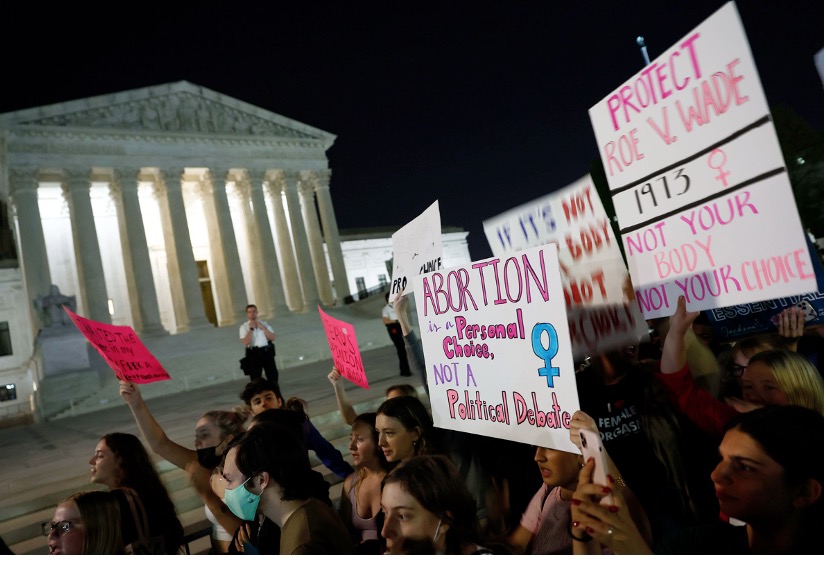CommentsSCOTUS - The Politico release of the unprecedented leak of the initial draft majority opinion that indicates the Supreme Court has voted to strike down Roe v. Wade has unleashed a tidal wave of responses from politicians.
Gov. Newsom joins other leaders across the country who vow to protect the right to abortion, but a troubling number promise full-out bans on reproductive rights, should the monumental case be overturned.

The SCOTUS ruling on Dobbs v. Jackson Women’s Health Organization is expected by the end of the Court’s term in June. The case before the Court concerns the constitutionality of a Mississippi state law that prohibits abortions after the 15th week of pregnancy, except in cases of medical emergencies or fetal abnormalities–and the Supreme Court’s decisions in Roe v. Wade (1973) and Planned Parenthood v. Casey (1992).
The Court will rule on the constitutionality of Mississippi’s pre-viability ban. The state has also asked the Court to overrule Roe and find there is no constitutional right to an abortion. Overruling Roe would open the floodgates for dozens of states to outlaw abortion.
A Divided Map
According to the Center for Reproductive Rights, half of U.S. states would outlaw abortion in the absence of Roe. While some of these states may revert to pre-Roe laws, at least a dozen have “trigger” laws ready to go following a ruling. States like Oklahoma have passed bills in their state legislatures, despite precedent.
36 million people in large swaths of the South, Midwest, and Great Plains states would be left without access to abortion,
Texas Trigger Law
Last year, the Texas Legislature passed a “trigger” law that would go into effect 30 days after the SCOTUS overturns Roe v. Wade. Under Texas law, abortions would be banned after 6-weeks of pregnancy or just two weeks after a first missed period. Performing abortions would be a felony. Doctors could face lifetime prison sentences and fines up to $100,000 for performing the procedure. The law also deputizes Texas civilians with a $10,000 bounty for anyone who reports on someone who had an abortion.
Travel Bans
Women who have the means may travel to neighboring states for abortion care. However, states that ban abortion may attempt to also ban out-of-state abortions. Missouri lawmakers considered such a bill that was ultimately blocked in the state legislature.
Millions Left Without Options
Without federal protections, the checkerboard access to reproductive rights will leave millions without options. Those with resources may be able to travel to other states, though the bans that start as little as 6 weeks after conception make it far more difficult logistically.
In addition, bans place far demand in states that protect abortion access. Planned Parenthood clinics in states neighboring Texas saw an 800 percent increase in abortion demand.
California: Abortion Rights Leader
The state of California is posed to be a leader in abortion rights. On Monday evening, following the leak, Gov. Newsom, Assembly Speaker Anthony Rendon, and Senate President pro tem Toni Atkins revealed a plan to propose an amendment to enshrine the reproductive rights in the state constitution.
In March, Gov. Newsom signed into law a bill that eliminates private health insurance co-pays, deductibles, and out-of-pocket costs for abortions on private health insurance.
California is one of six states to require insurance plans to cover abortions. Most women enrolled in Medi-Cal pay no out-of-pocket costs for the procedure.
Legislative Action
California lawmakers continue to work on bills that would protect and expand abortion access, as well as respond to the increase in out-of-state patients who will be forced to seek abortion care here due to bans in other states.
A package of bills introduced addresses barriers to abortion access, including:
--Providing key information and education about abortion access, financial support, coverage, logistical information, and assistance for travel, lodging, and other needs
--Civil and criminal protections for patients and providers
--Enhancing privacy protections
--Expanding abortion care providers and resources
--Allowing nurse-practitioners who meet specified criteria and training to provide first-trimester abortions
--Establishing a scholarship to recruit, train, and retain a diverse workforce of healthcare practitioners to provide reproductive services
--Providing grants to organizations that assist patients through direct practical and logistical support
What You Can Do
While access to reproductive services in California is expanding, this is not the case in half of the country, where women will need support to travel and access abortion care if Roe is overturned,
Most states have funds to support women with abortion access and several national organizations support abortion access, as well.
The grassroots organization Progress Report has created a fund to provide abortion access to women in Texas and other states where reproductive rights are increasingly difficult to access, as well as to legal groups fighting to protect a woman’s right to choose.
Act Blue provides a secure link to donate to the fund. The donations are split between 29 different funds, including Texas Equal Access fund. Donors can customize the amounts.
(Beth Cone Kramer is a professional writer living in the Los Angeles area. She covers Resistance Watch and other major issues for CityWatch.)






